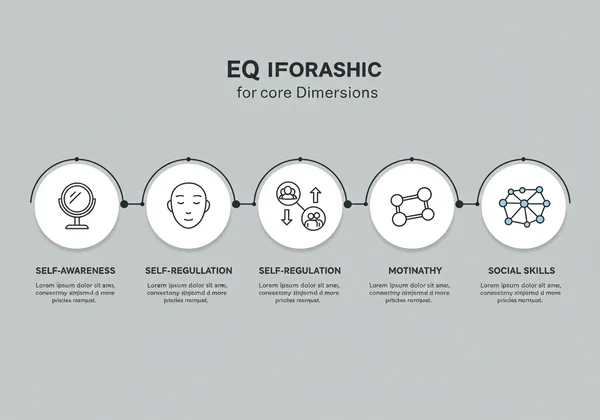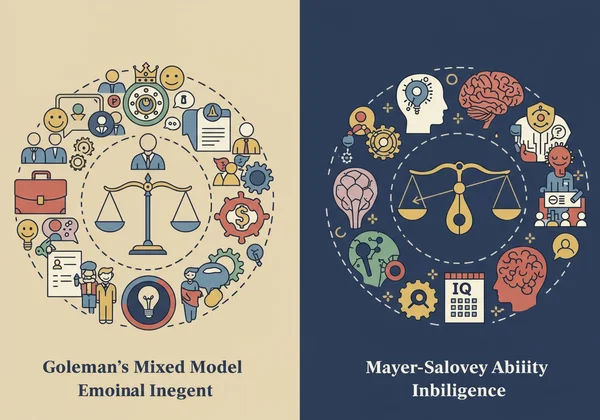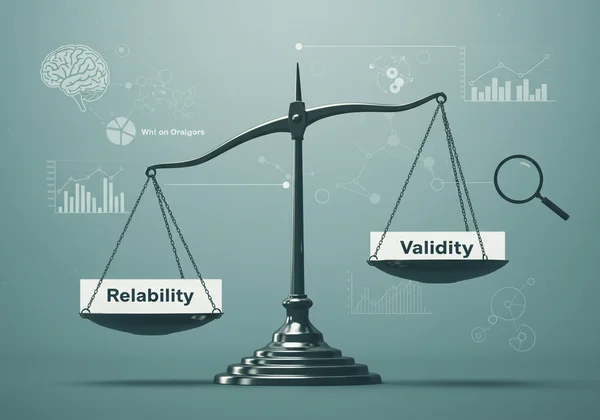Best Online EQ Test: Goleman, Mayer-Salovey, and AI Insights
September 2, 2025 | By Isla Caldwell
Confused by the array of emotional intelligence tests available? Discovering your EQ is a crucial step towards personal and professional growth, but choosing the right assessment can be challenging. If you've ever asked, "What is the most accurate EQ test?", you're not alone. This guide cuts through the noise, comparing leading scientific EQ models and revealing how to find an insightful EQ test that truly serves your needs. Ready to gain clarity? You can find a reliable test to start your journey of self-discovery.
Understanding Emotional Intelligence Assessments
Before diving into different models, let's establish a clear foundation. An emotional intelligence assessment is more than just a quiz; it's a structured tool designed to measure your capacity to perceive, understand, and manage your own emotions and those of others. The results provide a snapshot of your emotional skills, offering valuable self-insight.
What is an EQ Test and Why Does it Matter for You?
Simply put, an EQ test provides a quantifiable measure of your emotional intelligence. Imagine a mirror reflecting not just your appearance, but your emotional strengths and the areas ready for a little polish. Why is this important? High EQ is linked to better decision-making, stronger relationships, improved leadership, and greater overall well-being. Whether you're a student navigating social dynamics, a manager leading a team, or simply someone dedicated to personal growth, understanding your EQ is the first step toward unlocking your full potential.
The Core Dimensions Measured in EQ Tests
Most scientifically-backed emotional intelligence tests are built around a framework of core competencies. These typically include five key areas:
- Self-Awareness: The ability to recognize and understand your own emotions, moods, and drivers.
- Self-Regulation: The ability to control or redirect disruptive impulses and moods.
- Motivation: A passion for work for reasons that go beyond money or status.
- Empathy: The ability to understand the emotional makeup of other people.
- Social Skills: Proficiency in managing relationships and building networks.
A quality online eq test will evaluate you across these dimensions to provide a holistic view of your emotional landscape.

Major EQ Models: Goleman vs. Mayer-Salovey's Approach
Not all EQ tests are created equal because they are often based on different psychological models. The two most influential frameworks come from Daniel Goleman and the team of Peter Salovey and John Mayer. Understanding their differences is key to choosing the right assessment.
Daniel Goleman's Mixed Model of Emotional Intelligence
Daniel Goleman, who popularized the concept of emotional intelligence in his 1995 book, developed a "mixed model." It's called mixed because it combines cognitive abilities with personality traits, such as optimism and conscientiousness. Goleman's framework is heavily focused on workplace performance and leadership, making it extremely popular in corporate settings. His model is practical and directly links emotional competencies to professional success.
The Mayer-Salovey Ability Model of EQ
Psychologists John Mayer and Peter Salovey, who originally coined the term, proposed a more focused "ability model." They argue that emotional intelligence is a pure form of intelligence, much like IQ, based solely on cognitive abilities. Their model outlines four distinct branches of emotional skill:
- Perceiving Emotions: Recognizing emotions in oneself and others.
- Using Emotions: Harnessing emotions to facilitate thought.
- Understanding Emotions: Comprehending complex emotions and emotional language.
- Managing Emotions: Regulating emotions for personal and social goals. This model is often considered the more "academic" of the two, focusing strictly on one's capacity for emotional reasoning.
Comparing the Strengths and Focus of Each Model
So, which is better? Neither is inherently superior; they simply serve different purposes. Goleman’s model is excellent for personal development and coaching because its broad scope provides many avenues for improvement. The Mayer-Salovey model is ideal for a precise, scientific measurement of your core emotional reasoning abilities. A comprehensive and practical eq assessment often draws inspiration from both, blending theoretical purity with real-world application.

What Makes an EQ Test Truly Accurate and Reliable?
With countless "What's Your EQ?" quizzes online, how can you find an accurate eq test? The key lies in scientific validity. A trustworthy assessment isn't just a set of random questions; it's a carefully constructed instrument designed to produce consistent and meaningful results.
Key Criteria for a Valid Emotional Intelligence Test
When evaluating an online EQ test, look for these signs of quality:
- Theoretical Foundation: The test should be based on an established psychological model, like those from Goleman or Mayer-Salovey.
- Reliability: It produces consistent results if you take it multiple times under similar conditions.
- Validity: The test accurately measures the concept of emotional intelligence it claims to.
- Actionable Feedback: A good test doesn't just give you a number; it provides context and suggestions for growth.
Finding an assessment that meets these criteria is crucial for gaining genuine self-insight. You can test my eq with a tool designed with these principles in mind.

Avoiding Unscientific or Misleading EQ Quizzes
Be cautious of quizzes that promise to reveal your emotional intelligence in five simple questions. These are often created for entertainment and lack any scientific backing. They can provide misleading information that hinders rather than helps your personal growth journey. A credible test will feel thoughtful and comprehensive, asking situational questions that require genuine self-reflection.
Eqtest.co's AI-Powered Insights: A Next-Generation Assessment
This is where technology meets psychology to offer a superior experience. At our platform, we've developed an assessment that combines the rigor of established EQ models with the power of artificial intelligence to deliver insights that are both deep and accessible. Our approach is designed to give you more than just a score—it gives you a roadmap.

Get Your Free EQ Test and Instant Score
We believe that self-discovery should be accessible to everyone. That's why you can get your free EQ test on our platform without any registration required. The test is designed to be intuitive and engaging, guiding you through a series of situational questions. Upon completion, you immediately receive your overall EQ score and a summary of your results, giving you an instant baseline of your emotional intelligence.
Unlock Deeper Understanding with Our Personalized AI Report
While a score is a great starting point, true growth comes from understanding the "why" behind it. This is our key advantage. You have the option to unlock a personalized AI-driven report that goes far beyond a simple number. Our AI analyzes your unique response patterns to identify your specific emotional strengths, hidden challenges, and behavioral tendencies. It provides a detailed breakdown that helps you understand how your EQ manifests in real-life scenarios, from the workplace to personal relationships.
Actionable Strategies for Improving Your Emotional Intelligence
But what good is knowledge without action? Our AI report is designed to be a practical tool for change. It doesn't just tell you where you are; it gives you clear, actionable steps to improve emotional intelligence. You'll receive customized recommendations and exercises tailored to your specific profile. Whether you need to work on empathy, self-regulation, or social skills, our report provides a clear path forward, empowering you to make tangible progress. Ready to begin? Start your EQ test now.
Taking the Next Step in Your EQ Journey
Empowering your self-insight journey starts with choosing the right tool. Navigating the world of emotional intelligence assessments can seem complex, but by focusing on tests grounded in scientific models like Goleman's or Mayer-Salovey's, you can ensure you receive accurate and valuable feedback. An effective EQ test should not only measure your emotional skills but also illuminate a path for personal growth.
We provide a scientifically validated, free assessment to give you an immediate understanding of your EQ score. For those ready to go deeper, our unique AI-powered report offers the personalized, actionable insights needed to truly transform your emotional world. Don't just wonder about your emotional intelligence—measure it, understand it, and improve it. Discover your results and take the first step toward a more emotionally intelligent you.
Your Questions Answered: Diving Deeper into EQ
How can I test my EQ for free and ensure it's accurate?
You can find a free eq test on platforms like ours that base their questions on established psychological theories. To ensure accuracy, look for tests that are comprehensive, ask situational questions, and explain the science behind their assessment. Avoid short, superficial quizzes and opt for a tool that offers detailed feedback beyond just a single score.
What is a normal EQ score, and how does it compare to IQ?
Most EQ tests are scored on a scale where the average or "normal" score is around 100, similar to IQ tests. However, unlike IQ, which is relatively stable, EQ is a flexible set of skills that can be learned and improved over time. While both are valuable, many experts believe a high EQ is a better predictor of success and happiness than a high IQ.
Can a person have high IQ but low EQ, and what are the implications?
Absolutely. This is a common phenomenon. A person with high IQ but low EQ might be a brilliant strategist or problem-solver but struggle with teamwork, leadership, and managing interpersonal relationships. The implications can include career stagnation and personal dissatisfaction, which highlights the importance of developing emotional intelligence alongside intellectual abilities.
What are the five key areas of emotional intelligence measured in tests?
The five core components typically measured are: 1) Self-Awareness (understanding your emotions), 2) Self-Regulation (managing your emotions), 3) Motivation (driving yourself toward goals), 4) Empathy (recognizing emotions in others), and 5) Social Skills (handling relationships effectively). A thorough eq assessment test will evaluate your proficiency across all these critical areas.